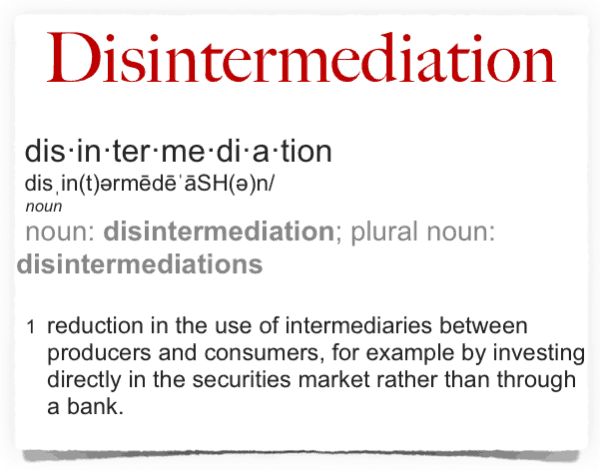If you’ve even casually followed the startup world over the last five years there’s a word that you’ve surely heard – disintermediation. It’s a fancy new word for a plain old business concept: cutting out the middleman. Disintermediation, to its devotees, is the role the internet was born to play. And with every successful startup platform turned “unicorn” (Silicon Valley speak for a company valued at $1bn+) the praise for disintermediation has increased.
 The burgeoning crowdfunding industry is founded in large part on the promise of disintermediation. Rather than raising money through a venture capital or private equity company, crowdfunding lets companies and projects disintermediate these institutions and connect directly with investors. This is an incredibly significant change and almost undoubtedly portends a paradigm shift for investing.
The burgeoning crowdfunding industry is founded in large part on the promise of disintermediation. Rather than raising money through a venture capital or private equity company, crowdfunding lets companies and projects disintermediate these institutions and connect directly with investors. This is an incredibly significant change and almost undoubtedly portends a paradigm shift for investing.
However, paradoxically lost in the conversation about the disintermediating power of crowdfunding is the intermediaries themselves and — more importantly — the real value they provide.
In the real estate context, private equity funds are often criticized as an intermediary for their high fees and restrictive terms. But there’s no denying that the good ones add real value – they source high-quality transactions, perform extensive diligence, negotiate terms and monitor or manage investments for the life of a deal. Although the fees may be high, the structures are typically designed to incentivize these funds to participate throughout the life of the deal and maximize investor profits.
Track Records Just Aren’t There Yet
 How do crowdfunding companies compare? A survey of crowdfunding companies can be discouraging: many don’t even purport to replace the diligence, selection and monitoring value they’re eliminating. Worse, many still charge substantial fees, which are rarely tied to investment performance. The fact is that as the industry currently stands, no site can credibly claim to replace the value provided by a well-established private equity fund; the industry is so young that the track records just aren’t there yet. Investors are forced to trade off the extra value provided by private equity companies to get access to the generally lower fees of crowdfunding platforms. As a result, the investment opportunities offered on crowdfunding sites are best suited to investors who are sophisticated enough to not need the value being disintermediated. (One additional value that crowdfunding platforms offer is access. For many investors, the aforementioned trade-off doesn’t actually occur because they never actually had access to the private equity fund investments. A more apt comparison for such investors is with publically available real estate investment vehicles, such as REITs or real estate ETFs).
How do crowdfunding companies compare? A survey of crowdfunding companies can be discouraging: many don’t even purport to replace the diligence, selection and monitoring value they’re eliminating. Worse, many still charge substantial fees, which are rarely tied to investment performance. The fact is that as the industry currently stands, no site can credibly claim to replace the value provided by a well-established private equity fund; the industry is so young that the track records just aren’t there yet. Investors are forced to trade off the extra value provided by private equity companies to get access to the generally lower fees of crowdfunding platforms. As a result, the investment opportunities offered on crowdfunding sites are best suited to investors who are sophisticated enough to not need the value being disintermediated. (One additional value that crowdfunding platforms offer is access. For many investors, the aforementioned trade-off doesn’t actually occur because they never actually had access to the private equity fund investments. A more apt comparison for such investors is with publically available real estate investment vehicles, such as REITs or real estate ETFs).
The challenge to the crowdfunding industry going forward is finding a way to either work with legacy players to harness their expertise while offering a more efficient investment product, or to develop the ability to independently offer similar value at a lower cost. The first option is more attainable; the second option more in line with the zeitgeist of technological disintermediation.
 One interesting possibility, with which AngelList has found success in the venture crowdfunding world, is facilitating a platform whereby investors can benefit from the investment decisions of other more experienced or noteworthy investors. In this model, instead of relying on the platform, investors rely on prominent investors or venture capitalists who are standing behind a deal and have both a track record of success and direct incentives for performing appropriate diligence. The AngelList solution isn’t perfect and it doesn’t have a perfect analogy in the real estate space. Still, the fundamental idea of replacing the value of the traditional middleman with a low-cost alternative – one that is still strongly incentivized to provide value – is sound.
One interesting possibility, with which AngelList has found success in the venture crowdfunding world, is facilitating a platform whereby investors can benefit from the investment decisions of other more experienced or noteworthy investors. In this model, instead of relying on the platform, investors rely on prominent investors or venture capitalists who are standing behind a deal and have both a track record of success and direct incentives for performing appropriate diligence. The AngelList solution isn’t perfect and it doesn’t have a perfect analogy in the real estate space. Still, the fundamental idea of replacing the value of the traditional middleman with a low-cost alternative – one that is still strongly incentivized to provide value – is sound.
The Wisdom of the Crowd
 In the long term, crowdsourcing diligence looms as an exciting prospect. The notion of the crowd as a diligence vehicle glimmers with irony since the ‘crowd’ deservedly has earned a reputation for infectious irrationality and the makings of market bubbles. The hope, however, is that the involvement of ‘the crowd’ may actually bring greater insight and information to bear on real estate finance. As James Surowiecki famously argued in his 2004 work The Wisdom of Crowds, a crowd of proper size and diversity – appropriately incentivized and operating with sufficient, unbiased information – will make collective decisions better than even the smartest of its constituent members. This principle has now been shown in the real world in numerous contexts, from the calibration of NFL point spreads to the prediction of election outcomes. When it comes to real estate finance, the idea is that a disparate and varied set of opinions – from contractors to economists to other real estate enthusiasts – will coalesce to identify good deals more effectively than any one individual or company could.
In the long term, crowdsourcing diligence looms as an exciting prospect. The notion of the crowd as a diligence vehicle glimmers with irony since the ‘crowd’ deservedly has earned a reputation for infectious irrationality and the makings of market bubbles. The hope, however, is that the involvement of ‘the crowd’ may actually bring greater insight and information to bear on real estate finance. As James Surowiecki famously argued in his 2004 work The Wisdom of Crowds, a crowd of proper size and diversity – appropriately incentivized and operating with sufficient, unbiased information – will make collective decisions better than even the smartest of its constituent members. This principle has now been shown in the real world in numerous contexts, from the calibration of NFL point spreads to the prediction of election outcomes. When it comes to real estate finance, the idea is that a disparate and varied set of opinions – from contractors to economists to other real estate enthusiasts – will coalesce to identify good deals more effectively than any one individual or company could.
 Of course, not every crowd is rational or smart – the recent swings of the stock market are a fine example of that. But, Surowiecki argued, ‘wise’ crowds should arise when four criteria are adhered to: diversity of opinion, independence, decentralization and aggregation. A full analysis of Surowiecki’s criteria is beyond the scope of this piece, but we can certainly infer that for platforms to foster crowds that operate rationally and for the collective good, they must empower investors with robust information without pushing them toward any artificial consensus.
Of course, not every crowd is rational or smart – the recent swings of the stock market are a fine example of that. But, Surowiecki argued, ‘wise’ crowds should arise when four criteria are adhered to: diversity of opinion, independence, decentralization and aggregation. A full analysis of Surowiecki’s criteria is beyond the scope of this piece, but we can certainly infer that for platforms to foster crowds that operate rationally and for the collective good, they must empower investors with robust information without pushing them toward any artificial consensus.
Crowdfunding Must Drive Value
For a host of reasons, such a level of information access and impartiality has yet to be realized in the crowdfunding space. And while it’s important to acknowledge this long-term theoretical potential, it is equally important that, in the near term, the industry does a better job of replacing the value in the economic chain that is being removed. The reality is that crowdfunding sites have strong short-term incentives to do as many deals as possible in order to entrench themselves as volume-based market leaders. That is an economically unsustainable model, absent effective counterbalances. The responsible platforms put a real emphasis on due diligence to mitigate this inherent risk while attempting to find a more scalable long-term solution.
This solution begins with platforms both acknowledging the value of the parties they’re disintermediating and better harnessing the pool of knowledge and experience that the new investing medium allows them to access.
 Charles Clinton is the CEO of EQUITYMULTIPLE, a real estate crowdfinance platform. Charles is responsible for shaping the strategic vision of the company and overseeing its daily operations. Charles also sits on EQUITYMULTIPLE’s investment committee and board of directors. Prior to EQUITYMULTIPLE, Charles was a real estate attorney with Simpson, Thacher & Bartlett, where he worked on numerous multi-billion dollar transactions, primarily for Blackstone. Charles received his JD and Business Law Certificate from Berkeley Law and his Bachelor’s degree from Amherst College.
Charles Clinton is the CEO of EQUITYMULTIPLE, a real estate crowdfinance platform. Charles is responsible for shaping the strategic vision of the company and overseeing its daily operations. Charles also sits on EQUITYMULTIPLE’s investment committee and board of directors. Prior to EQUITYMULTIPLE, Charles was a real estate attorney with Simpson, Thacher & Bartlett, where he worked on numerous multi-billion dollar transactions, primarily for Blackstone. Charles received his JD and Business Law Certificate from Berkeley Law and his Bachelor’s degree from Amherst College.


